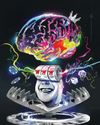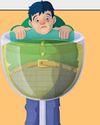
Positive thinking sometimes gets a bad reputation. Why? Well, because a lot of people think it is steeped in a denial of reality, and believe it can negatively impact our wellbeing as it does not allow us to process difficult emotions or feelings.
However, positive thinking is not about ignoring reality, but rather choosing to focus on potential solutions, being open to new ways of thinking, and finding something to be hopeful for. It can be a useful strategy for mentally and emotionally dealing with the many uncertainties and challenges of life. Our ability to look for the positives in a situation is known as 'cognitive reframing' and trains us to challenge and change our perspective of a scenario. And if you need any more encouragement to give it a go, a growing number of studies have found that positive thinking can benefit our physical health, as well as our mental health.
For example, researchers from Northwestern University in the US have discovered that people who have a positive attitude are less likely to experience memory decline as they get older. As part of a national study, the team monitored adults at certain points over a decade, each time surveying their mood in the previous 30 days, along with their memory recall. They concluded that having a positive attitude was associated with a less steep decline in memory.
Esta historia es de la edición October 2022 de BBC Science Focus.
Comience su prueba gratuita de Magzter GOLD de 7 días para acceder a miles de historias premium seleccionadas y a más de 9,000 revistas y periódicos.
Ya eres suscriptor ? Conectar
Esta historia es de la edición October 2022 de BBC Science Focus.
Comience su prueba gratuita de Magzter GOLD de 7 días para acceder a miles de historias premium seleccionadas y a más de 9,000 revistas y periódicos.
Ya eres suscriptor? Conectar

NOW YOU SEE ME, NOW YOU DON'T
Scientists around the world are working on ways to hide us from sight. But how close are we to developing tech that could make us invisible?

UNCORKED POTENTIAL
How much good can ditching drink for a month really do? Answer: a whole lot. In fact, science shows even short-term abstinence could unlock a cocktail of lasting benefits

Scientists discover when humans and dogs became friends
The relationship spans thousands of years, but experts might have pinpointed the first connection

Why it's so hard to kick a gambling addiction
We now know that gambling can be as addictive as drugs, but there are factors that can make it even harder to quit

How much could Ozempic change our world?
The weight-loss drug has made headlines and broken sales records, but what does it mean for our future?

WHY DOES DRINKING ALCOHOL MAKE IT SO MUCH HARDER TO LOSE WEIGHT?
While enjoying the occasional glass of wine or pint of beer may seem harmless, regular or excessive alcohol consumption can significantly hinder your weight-loss journey for a few reasons:

Why do so many New Year's resolutions fail?
Establishing positive new habits is hard at any time of year. But there are ways to stop your attempts ending in failure

'Extreme' solar radiation storm could hit Earth
Sun-like stars may have tantrums far more frequently than we thought

HOW CAN I BANISH THE JANUARY BLUES?
Dark mornings, long chilly evenings and short days; many people find January tough.

Neutrinos are getting in the way of dark matter detection
These troublesome particles are difficult to detect, but they're starting to show up in places where they're not wanted